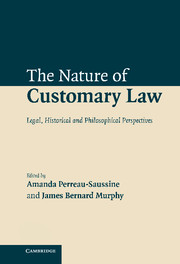Book contents
- Frontmatter
- Contents
- List of contributors
- Table of cases
- The character of customary law: an introduction
- Part I Custom and morality: natural law, customary law and ius gentium
- 1 Pitfalls in the interpretation of customary law
- 2 The moral role of conventions
- 3 Habit and convention at the foundation of custom
- 4 Custom, ordinance and natural right in Gratian's Decretum
- 5 Vitoria and Suarez on ius gentium, natural law, and custom
- 6 Custom and positivity: an examination of the philosophic ground of the Hegel–Savigny controversy
- Part 2 Custom and law: custom, common law and customary international law
- Index of names
2 - The moral role of conventions
Published online by Cambridge University Press: 30 June 2009
- Frontmatter
- Contents
- List of contributors
- Table of cases
- The character of customary law: an introduction
- Part I Custom and morality: natural law, customary law and ius gentium
- 1 Pitfalls in the interpretation of customary law
- 2 The moral role of conventions
- 3 Habit and convention at the foundation of custom
- 4 Custom, ordinance and natural right in Gratian's Decretum
- 5 Vitoria and Suarez on ius gentium, natural law, and custom
- 6 Custom and positivity: an examination of the philosophic ground of the Hegel–Savigny controversy
- Part 2 Custom and law: custom, common law and customary international law
- Index of names
Summary
‘Is it a custom?’ the visiting Horatio asks Hamlet after hearing ordnance shot off. Hamlet replies that it is (‘Ay marry is't’), but says that ‘it is a custom more honoured by the breach than the observance'. This paper considers the relationship of custom to what is honourable, moral, the right thing to do. Hamlet's claim can be taken in two distinct ways. Is he making the descriptive claim that people don't actually follow the custom that much, honouring it more by breach than by observance? Or is he making the prescriptive claim that although it is the local custom it would be more honourable to breach it than observe it? The context makes the latter much more likely, not just because of Hamlet's general attitude but because of the particular way that he introduces his claim. He says, ‘But to my mind, though I am a native here and to the manner born, it is a custom …’ Although to the manner (manners; custom) born, he has his own oppositional mind. There is what people generally, the natives, find honourable, which is to fire the cannon when the king drinks. And then there is what Hamlet himself finds honourable, which is not to engage in such frippery. For Hamlet, what people conventionally find right, and consequently conventionally happens, is not what is really right. Or at least, uncertain as he is, he entertains the idea.
- Type
- Chapter
- Information
- The Nature of Customary LawLegal, Historical and Philosophical Perspectives, pp. 35 - 52Publisher: Cambridge University PressPrint publication year: 2007
- 1
- Cited by

